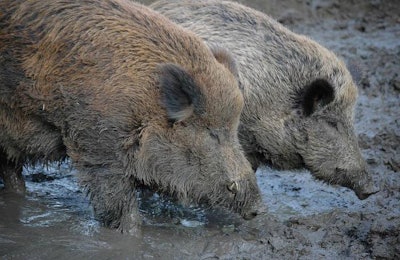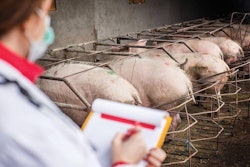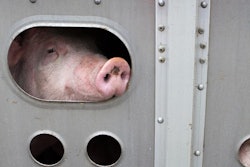
Officials report the return of African swine fever (ASF) to China and Myanmar, while South Korea has recorded almost 100 new cases of the disease in wild boar.
After a short absence, the ASF virus has been detected again in Hubei province, China.
A total of seven wild boar have been found dead near Yangri town in the Shennongjia forest of Hubei. The animals tested positive for the virus, according to a report to the World Organisation for Animal Health (OIE) from China’s agriculture ministry.
The virus was last detected in the region in September of last year, and the source of the latest infection is unknown.
Coronavirus (COVID-19) is complicating the ASF situation in China, according to a new report.
ASF detected in new area of Myanmar
At a farm in Myanmar where three pigs died last month, the presence of the ASF virus has been confirmed to the OIE by Myanmar’s animal health agency. The farm — at Momauk in Kachin state — had 365 pigs.
This is the first occurrence of ASF in the state, according to the official report. Kachin is in the north of Myanmar, and borders the Chinese province of Yunnan. Source of the latest infection is unknown. Officials suspect illegal animal movements, swill feeding and/or fomites (people and equipment).
At the start of February, Myanmar reported the return of ASF to another of its northern states, Shan. Here, the disease reappeared in a small pig herd in the first week of February, after an apparent absence since December 2019. Shan state lies to the south of Kachin, and also shares a long frontier with China.
South Korea reports ASF in more wild boar
According to the latest reports to the OIE from South Korea’s agriculture ministry, a further 99 wild boar have tested positive for the ASF virus. These animals were identified over a period from early February to March 3.
All were found in areas reporting previous cases in the north of the country, near to the border with North Korea. Highest numbers of cases were in the Hwacheon region of Gangwon province, and in Yeoncheon county in Gyeonggi province. Ten of the animals were from the Paju region of Gyeonggi.
Latest reports from news agency Yonhap put the total number of wild boars testing positive for the ASF virus at 325. The five most recent cases were also found in the border area of Gyeonggi — in Yeoncheon, Paju and Gunnae.
South Korea first reported ASF at a farm in September 2019. Confirmed at a total of 14 farms, the most recent cases of the disease in domestic pigs was in October. To control the disease, South Korea has culled around 400,000 pigs, according to Yonhap.
Continued spread of ASF in the Philippines
ASF continues to spread in Camarines Sur, a province in the south of the island of Luzon in the Philippines. Head of the Department of Agriculture, William Dar, has again urged farmers and traders not to transport ASF-infected pigs or pork products, reports Philippine News Agency (PNA).
Rizal — the province where the disease was first detected in the Philippines — is now free of ASF, according to Dar. He said around 237,000 hogs out of the total inventory of 12.8 million have so far been culled to control the spread of infection.
The disease has been confirmed in multiple provinces on the islands of Luzon and Mindanao.
ASF-free regions such as Visayas remain on high alert for signs of the disease, reports PNA. Regional head of the agriculture department for the region has stressed the high risks of transmitting the infection in infected food waste fed to pigs, or through illegal animal movements.
Just last month, President Rodrigo Duterte signed an executive order to create a national task force to tackle the ASF situation in the Philippines.
Chinese ASF vaccine shows promise
A vaccine developed at Harbin Veterinary Research Institute in China has been shown in lab tests to be safe and effective against ASF.
Reduced virulence of the live vaccine has been achieved through gene deletion, reports The Straits Times. Harbin scientists said this is the most effective vaccine developed so far for commercial production. No indication was given about when the vaccine would be available on the market.
A recently published paper from researchers based in the United Kingdom sets out new understanding of the ASF virus. Their work lays the groundwork for ways to control ASF, either by vaccination or antiviral compounds that could be added to animal feed.
Since the first ASF cases in China in August of 2018, the disease has been confirmed in a total of 12 Asian countries (including Russia’s Far Eastern federal district). The infection has also been reported in Europe and Africa.
In the U.S., the agriculture department has recently announced it is stepping up ASF controls.
View our continuing coverage of the global African swine fever situation.

















